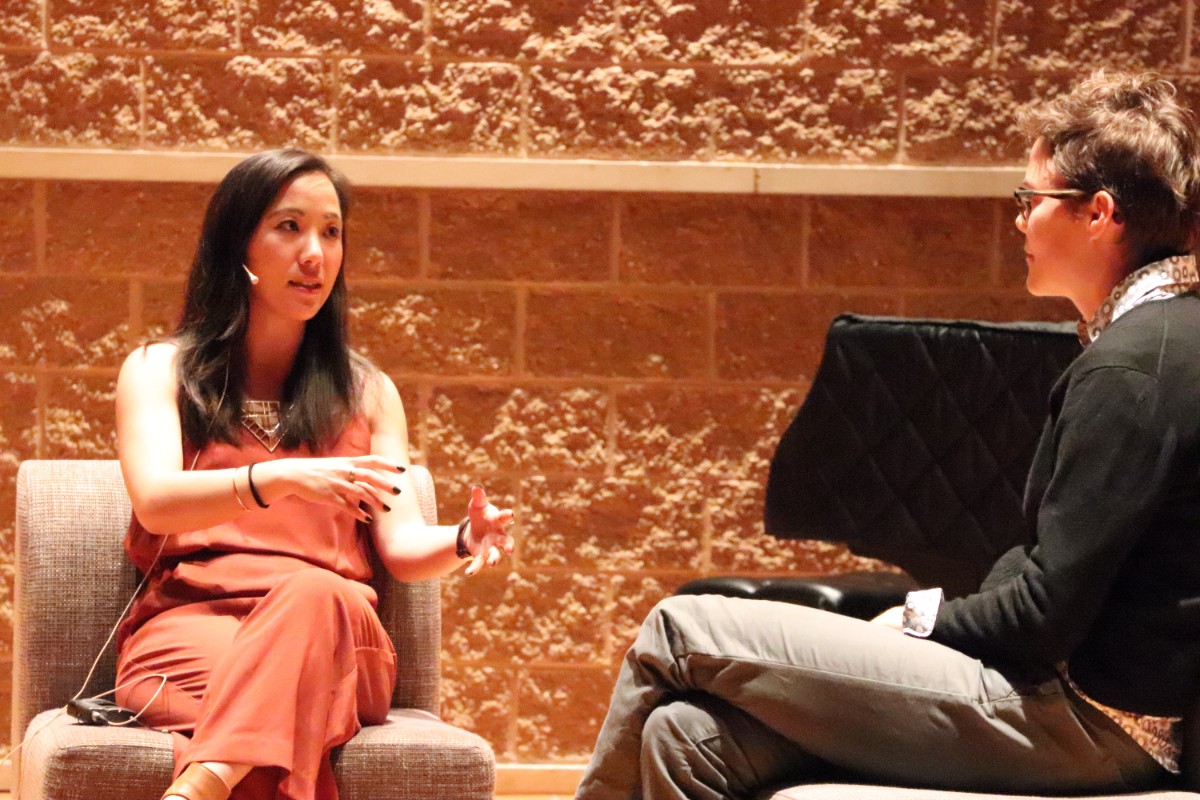“A lot of my job is to share the stories of other people who might not have the opportunity to have their stories be heard,” said Kat Chow, featured speaker at Valparaiso University’s Pathways to Purpose Speaker Series on Wednesday night.
The event, Telling Complicated Stories: A Conversation with NPR’s Kat Chow, was touted as a sort of turning of the tables, as the interviewer would become the interviewee, in the final installment of the Spring Speaker Series. At this event, Chow would have the opportunity to have her story be heard.
Chow is a founding member of NPR’s Code Switch podcast and contributes to NPR’s flagship radio programs. Code Switch is a team of journalists fascinated by the overlapping themes of race, ethnicity and culture, how they play out in our lives and communities, and how all of this is shifting.
“We really feel that Kat connects not only with our students of color, but with our journalism, digital media, and communications majors to people who are trying to figure out how to tell stories in a way that changes the conversation," said Thais Carter, who coordinated the series.
Pathways to Purpose seeks to, “help undergraduates cast a vision for what’s possible,” explained Carter.
For those focused on journalism, as Chow noted in the interview, job opportunities might appear hard to come by. She described her own journey to where she is now, and the motivations that have carried her through the relentless news cycle all these years.
The interview itself lasted about half an hour, and then the floor was opened up to the audience to ask their own questions.
Liz Wuerffel, Associate Professor of Art, who is teaching a podcasting class this semester, was tapped to interview Chow. In a way, this particular interview was kind of her idea in the first place.
“Code Switch is a really great podcast that NPR does,” Wuerffel said, admitting that she is among their audience nearly every week.
Wuerffel’s interest in Code Switch specifically, and NPR generally, is tied to her involvement as co-director of The Welcome Project. Through The Welcome Project, she has been collecting stories from local residents for about nine years.
“A podcast like Code Switch is a thing we keep in mind because we like to hear what public radio is doing in terms of collecting stories and influencing how we think about our own work,” Wuerffel said.
Many in attendance were students, using laptops, cellphones, and sheets of ruled paper to capture their own reactions to Chow’s interview.
After the event, attendees were able to meet with Chow, and the hall remained busy with small groups forming to reflect on what they’d heard.
One of Wuerffel’s students, senior Carly Newton, who is double-majoring in Digital Media and Professional Writing, had listened to one of Chow’s stories earlier that day because it related to something she was studying in class.
Of the event, Newton said, “I thought it was fascinating.”
But not everyone in the audience was a student, and this is by design. The series is, after all, completely free and open to the public. Some of the audience was faculty, and some were even in grade school.
“Discernment doesn’t end with a degree,” Carter said, “Just because you’re not in school anymore doesn’t mean you’re not asking questions about where you want to be in the world, and we really want [Pathways to Purpose] to be the type of program that inspires.”
One audience member who lives nearby, Joke Raelatejeo, learned of the event through social media. As a fan of both Chow and Code Switch, Raelatejeo was immediately intrigued.
But there’s another reason Raelatejeo was drawn to the event. As an Assistant Manager at the Center for Workforce Innovations, Raelatejeo works in adult education, helping those that missed out on their high school diploma find success by earning the high school equivalency.
“It coincides really well with my work,” Raelatejeo said. “Often, their difficult stories are what holds them back from finishing that step.”
“Sharing difficult stories – that’s real!” said Raelatejeo, which brings us back to where we began. Chow’s career is not just about reporting – it’s about storytelling and giving unheard voices an audience, or the other way around.
For some, it’s not the telling of the story that’s hard; it’s hearing a hard story that’s, as Raelatejeo put it,“real!”
Whether student, faculty, or interested public, Telling Complicated Stories was a chance to learn about both telling and hearing stories.
If you missed Chow’s story but would like to hear it, you can find it on the Pathways to Purpose YouTube channel


